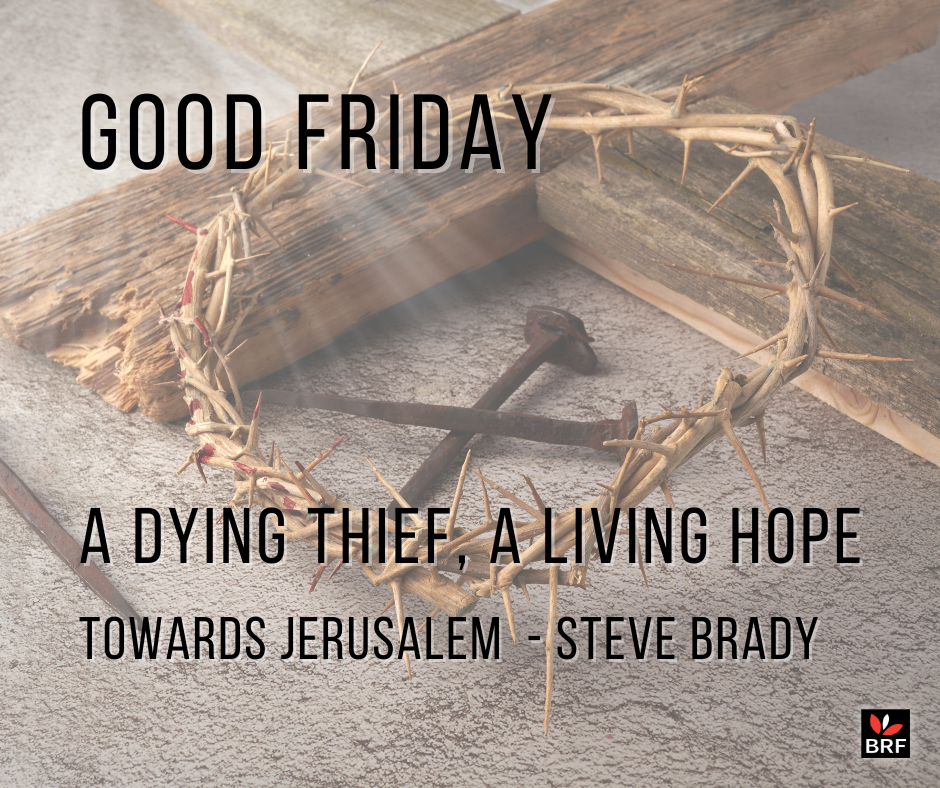A dying thief, a living hope - Good Friday
taken from Towards Jerusalem by Steve Brady
Good Friday
A dying thief, a living hope
There was a written notice above him, which read: THIS IS THE KING OF THE JEWS. One of the criminals who hung there hurled insults at him: ‘Aren’t you the Messiah? Save yourself and us!’ But the other criminal rebuked him. ‘Don’t you fear God,’ he said, ‘since you are under the same sentence? We are punished justly, for we are getting what our deeds deserve. But this man has done nothing wrong.’ Then he said, ‘Jesus, remember me when you come into your kingdom.’ Jesus answered him, ‘Truly I tell you, today you will be with me in paradise.’
LUKE 23:38–43
‘These verses… deserve to be printed in letters of gold. They have probably been the salvation of myriads of souls,’ commented the great J.C. Ryle, the first Anglican bishop of my hometown of Liverpool. But not everyone, for here are three men: one died in sin; another to sin; the third for sin.
It is often assumed when people are in deep straits, especially approaching the end of life, that a ‘just in case there is a God’ insurance-policy faith kicks in. But pain, suffering and certain death do not necessarily lead to a death-bed conversion, as the first criminal’s behaviour highlights. Like the rulers who ‘sneered’ (v. 35) and the soldiers who ‘mocked’ (v. 36), this man ‘hurled insults’ at Jesus (v. 39). Terrifyingly, he illustrates that it is possible to be near to Jesus, speak to Jesus and die with Jesus, and yet be lost. Someone wisely remarked that the essence of heaven is to say to God, ‘Your will be done’, while the essence of hell is when God says to us, ‘Your will be done!’ This man was a successful rebel to the end.
In stark contrast, there hangs another thief. Both Matthew and Mark record that both criminals ‘heaped insults’ on Jesus (Matthew 27:44; Mark 15:32). So what changed his attitude to Christ? Commentators have speculated that he had heard Jesus preach. Others, that he knew that both Pilate and Herod thought Jesus innocent. Yet others, that his conscience was pricked by our Lord’s prayer for his enemies and his calm demeanour in death. Who knows? What is clear, however, is that he feared God, owning up to his wrongdoing (vv. 40–41). He believed, despite the evidence to the contrary, that Jesus did have a kingdom (as the title on Jesus’ cross inadvertently advertised), and he wanted to be part of it (vv. 38, 42). He had no good works to offer, no possibility of enjoying the sacraments, no church to join. But he repented, believed and was saved. Amazing grace!
And why is Jesus there, between two criminals (v. 33)? A thief too? He fed the 5,000. A murderer? He healed the sick and raised the dead. The victim of a miscarriage of justice? Undoubtedly, but he said he could call on ‘twelve legions of angels’ to deliver him (Matthew 26:53). So why is he there? Two charges emerge from the gospel records: blasphemy (Mark 14:64) and rebellion (Luke 23:14). The irony here is that the centurion confesses that Jesus is both ‘a righteous man’ and ‘the Son of God’ (Luke 23:47; Mark 15:39).
Truly, he had ‘done nothing to deserve death’ (Luke 23:15). We have! Don’t we all stand as rebels before a holy God? Aren’t there times when we feel the lure of almightiness, the blasphemy that we are kings of the castle, godlike creatures on earth without a God up there to whom we are accountable? The gospel comes to tell us of one who has taken the hit for our pride and folly. If the released felon Barabbas, ‘thrown into prison for insurrection and murder’ (23:25), had turned up at the cross, he might accurately have said, ‘That man is there in my place, paying my price, dying my death, so I can go free!’ But only Barabbas? Truly, ‘We all, like sheep, have gone astray… and the Lord has laid on him the iniquity of us all’; for ‘the Son of Man… [came] to serve, and to give his life as a ransom for many’ (Isaiah 53:6; Mark 10:45).
A church I visited years ago had a sermon in stone on an outside wall. It consisted of three crosses, the one on the left pointing inwards towards the central cross and the one on the right pointing away. Wisely, Bishop Ryle reminds us: ‘One thief was saved that no sinner might despair; but only one, that no sinner might presume.’ Which way am I looking as the Lord of glory gives his life as a ransom for the world?


